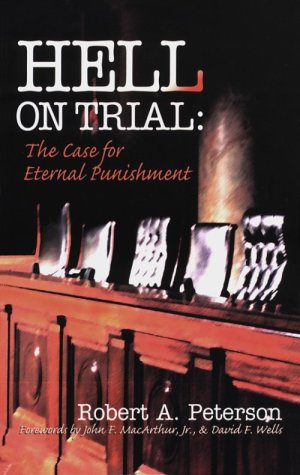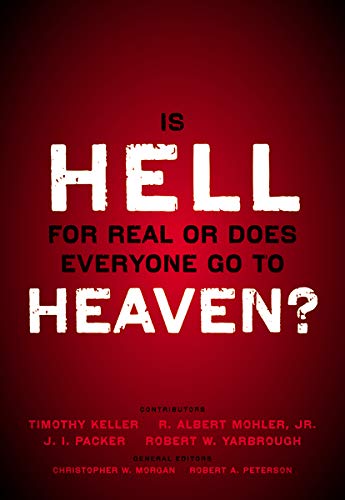Quotes about Hell-Justified
The punishment must fit the crime. The misery and torment of hell point to the wickedness and seriousness of sin. Those who protest the biblical doctrine of hell as being excessive betray their inadequate comprehension of the sinfulness of sin. For sinners to be consigned to anything less than the horrors of eternal punishment would be a miscarriage of justice.
The Horror of Hell, Tabletalk, October 2008, p. 55. Used by Permission of Ligonier Ministries.
How can God exact infinite punishment for a finite sin? First, because the person against whom all sin is committed is infinite. Crimes against the infinitely holy, infinitely kind, infinitely good, and infinitely supreme Ruler of the world deserve unending punishment. In addition to that, those condemned to hell will go on sinning for eternity. There is no repentance in hell. So the punishment will continue as long as the sinning does.
The Horror of Hell, Tabletalk, October 2008, p. 55. Used by Permission of Ligonier Ministries.
Our obligation to love, honor, and obey any being is in proportion to his loveliness, honorableness, and authority… But God is a being infinitely lovely, because He hath infinite excellence and beauty… So that sin against God, being a violation of infinite obligations, must be a crime infinitely heinous, and so deserving infinite punishment… The eternity of the punishment of ungodly men renders it infinite…and therefore renders [it] no more that proportionable to the heinousness of what they are guilty of.
The Justice of God in the Damnation of Sinners, The Works of Jonathan Edwards, v. 1, Banner of Truth, Used by Permission, 1974, p. 669.
If we recognize degrees of heinousness between a crime against one human being and another, we can see that the difference between a crime against a human and against the divine Being as infinite, and requires an infinitely more severe punishment.
If there is such a thing as sin, there is such a thing as crime, a specific form of sin. And if we all agree that there is such a thing as crime, or sin, then it deserves punishment… [But] in the opinion of many, not only does crime not deserve punishment, but punishment is the crime.
We are outlaws; we are violators of God’s will; we are spurners of the light of nature and natural revelation which we do have. We are entitled to nothing but Hell. If God leaves us to that to which we are entitled, who will call Him unjust?
Hell glorifies God because:
1. It shows that He keeps His Word.
2. It shows His infinite worth, lasting forever.
3. It demonstrates His power to subdue all who rebel against Him.
4. It shows how unspeakably merciful He is to those who trust Him.
5. It upholds the reality of love by visiting justice against those who reject God, who is love.
6. It vindicates all who suffered to hear or proclaim the truth of God’s Word.
7. It shows the enormity of what Jesus accomplished when He died to save all who would trust Him from the hell they deserved. If there were no hell, there would be no need for the cross.
How Does Hell Glorify God? © 9Marks. Website: www.9Marks.org. Email: [email protected]. Toll Free: (888) 543-1030. Used by Permission.
As with these compelling words from the lips of Christ, the concept of choice demands that we believe in hell. Without hell, there is no choice. And without choice, heaven would not be heaven; heaven would be hell. The righteous would inherit a counterfeit heaven, and the unrighteous would be incarcerated in heaven against their wills, which would be a torture worse than hell. Imagine spending a life-time voluntarily distanced from God only to find yourself involuntarily dragged into His presence for all eternity.
If one is filled with revulsion at the thought that such vengeance is ascribed to a Savior whose love and tenderness are beyond all imagination and description, might not the solution be that these very attributes make hating and rejecting such a Savior worthy of supreme retribution?
In the long run the answer to all those who object to the doctrine of hell is itself a question: “What are you asking God to do?” To wipe out their past sins and, at all costs, to give them a fresh start, smoothing every difficulty and offering every miraculous help? But He has done so, on Calvary. To forgive them? They will not be forgiven. To leave them alone? Alas, I am afraid that is what He does.
Since God is a just Judge, we must love and laud His justice and thus rejoice in God even when He miserably destroys the wicked in body and soul; for in all this His high and inexpressible justice shines forth. And so even hell, no less than heaven, is full of God and the highest Good. For the justice of God is God Himself; and God is the highest Good. Therefore even as His mercy, so His justice or judgment must be loved, praised, and glorified above all things.
Cited in: Hell on Trial: The Case for Eternal Punishment by Eugene Peterson, P&R Publishers, 1995, p. 111-112.
Hell exists because unbelievers are eternally guilty. The powerful lesson to be learned is that no human being’s suffering can ever be a payment for sin. If our suffering could erase even the most insignificant sin, then those in hell would eventually be freed after their debt was paid. But all human goodness and suffering from the beginning of time, if added together, could not cancel so much as a single sin. Could my zeal no respite know, could my tears forever flow, all for sin could not atone; Thou must save, and Thou alone. “Rock of Ages”
Taken from One Minute After You Die by Erwin Lutzer, Moody Publishers, 1997, p. 107. Get this book!
What if, from God’s viewpoint, the greatness of sin is determined by the greatness of the One against whom it is committed? Then the guilt of sin is infinite because it is a violation of the character of an infinite Being. What if, in the nature of God, it is deemed that such infinite sins deserve an infinite penalty, a penalty which no one can ever repay?
Taken from One Minute After You Die by Erwin Lutzer, Moody Publishers, 1997, p. 108. Get this book!
Jonathan Edwards said that the reason we find hell so offensive is because of our insensitivity to sin.
Those who reject Christ do so because they are content with darkness. And because they choose darkness rather than light, they will forever have darkness rather than light. Eternity simply crystallizes the choice into permanence.
How could He who is the Sum of all excellency look with equal satisfaction upon virtue and vice, wisdom and folly? How could He who is infinitely holy disregard sin and refuse to manifest His “severity” (Rom. 9:22) toward it? How could He, who delights only in that which is pure and lovely, not loathe and hate that which is impure and vile? The very nature of God makes Hell as real a necessity, as imperatively and eternally requisite, as Heaven is.
The Attributes of God, Baker Book House, p. 83.
Get this book!
The penalty for sin is determined by the magnitude of the one who is sinned against. If you sin against a log, you are not very guilty. On the other hand, if you sin against a man or a woman, then you are absolutely guilty. And ultimately, if you sin against a holy and eternal God, you are definitely guilty and worthy of eternal punishment.
Taken from Follow Me by David Platt. Copyright © 2013 by David Platt. Used by permission. Website: Radical.net. Page 31.
Each sin is an infinite violation against an infinite God that deserves infinite justice and an infinite punishment. A failure to punish sin would be a failure to allow God to be God.
You call Me master, and obey Me not;
You call Me light, and see Me not;
You call Me the way, and walk Me not;
You call Me life, and live Me not;
You call Me wise, and follow Me not;
You call Me fair, and love Me not;You call Me rich, and ask Me not;
You call Me eternal, and seek Me not.
If I condemn thee, blame Me not.
How does it seem to comport with God’s justice – to punish a sin committed in a moment – with eternal torment?
1. Because there is an eternity of sin in man’s nature. They will continue to sin in hell. “Men gnawed their tongues in agony and cursed the God of heaven because of their pains and their sores, but they refused to repent of what they had done” (Rev. 16:10-11).
2. Because sin is “committed against an infinite majesty,” and therefore the sin itself is infinite, and proportionally the punishment must be infinite.
3. Because a finite creature cannot satisfy infinite wrath, he must be eternally paying what he can never pay.

















